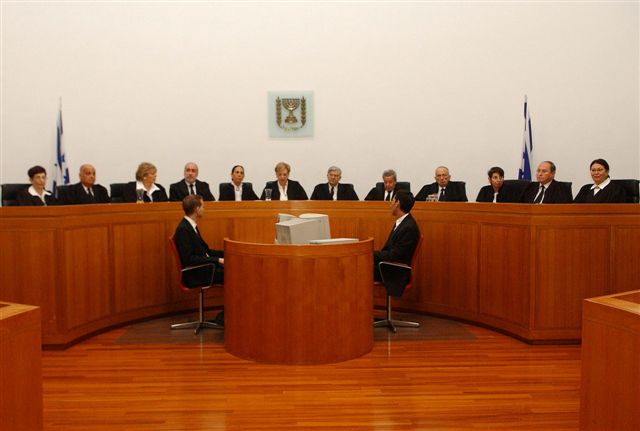Restricting the Online Freedom of Expression of Palestinian Citizens of Israel: Recent Practices and Trends (March 2018)
[CLICK HERE to read this report in PDF format]
Freedom of expression online is an important tool for Palestinian citizens of Israel who wish to exert pressure on Israeli decision-makers to end various forms of discrimination against them, particularly given their ongoing under-representation in positions of power in the state. The Internet, and particularly the various social media networks, has become a “marketplace” in which people are able to exchange ideas and initiate actions aimed at engendering positive change. The accessibility of online space to all has brought the ability to influence the political, social, and economic discourse within the reach of all citizens, including those whose voices have been historically marginalized, including members of the Palestinian minority in Israel.
This position paper analyzes recent developments in state policy that place increasing restrictions on the freedom of expression of Palestinian citizens in Israel in the virtual space, imposed by or approved by all three branches of government – the legislature, the executive, and the judiciary.
The restrictions on the freedom of expression rights of Palestinian citizens of Israel on the Internet comprises actions that are inherently unconstitutional and/or are implemented without proper legal authority. They also show the discriminatory application of the law and implementation of state practices.
I. Knesset Legislation
Authorities for the Prevention of Committing Crimes through Use of an Internet Site Law – 2017 (“The Internet Law”)
This law, which came into effect in July 2017, empowers a district court judge, at the request of the state, to order Internet service providers to:
The establishment of the “Cyber Unit” within the State Attorney’s Office
In 2015, the State Attorney’s Office established the Cyber Unit, which was charged with adapting the means available to the State Attorney’s Office to the challenges of law enforcement in cyberspace. A report published by the unit in 2016 summarizing its activities describes its functions and powers and includes statistical data on the specific content that caused it to take action. According to the report, the Cyber Unit operates both on the level of traditional criminal law enforcement, by opening investigations and filing indictments for offenses committed on the Internet, and in the realm of “alternative enforcement”, primarily regarding offenses of expression on the Internet. Within the alternative track, the unit acts “to remove forbidden content, restrict access to it through search results on a search engine, block access to such contents, and suspend and bar Internet users”. Here the unit operates directly against the service providers both on a "voluntary" basis, in order to remove the prohibited content, and, if the provider does not cooperate with the unit, via requests to the courts to compel the providers to remove certain content. According to the report, the unit has received cases regarding up to 2,241 items of content that allegedly violates the law since the start of its operations. Of these, 1,554 items were removed, 162 were partially removed, 422 were not removed, it was decided not to process 51, and 52 cases are ongoing. Of the total number of requests to remove content submitted by the unit, 2,023 were based on grounds of incitement to violence and terrorism, 155 on defamation and infringement of privacy, 34 on the breach a gag order, and two on unspecified grounds.
In 2016, Adalah wrote to the Ministry of Justice requesting information about the procedure that the Cyber Unit follows in fulfilling its functions. Adalah sought, inter alia, information on the criteria or guidelines for defining content as “inciting content” and a user’s account as an “inciting account”; which body is authorized to define and classify contents/users as inciting; how many of the requests for removal/blocking content were submitted against Jewish users and how many against Arabs. The partial response of the Ministry of Justice described the process of removing and blocking content posted by users on the Internet as follows:
“The forbidden content reaches the Cyber Unit and the employees of the Unit initially examine whether the expression violates Israeli law and whether they can be dealt within the framework of ordinary criminal procedures (launching criminal proceedings against the publisher). Thereafter, they measure the scope of the publication, its dissemination, and its availability to the general public, and finally, they examine the protected interest that was harmed by the publication. If the decision is made to take steps to remove the publication, this action is executed by the employees of the Cyber Unit. The examination is conducted pursuant to Israeli law and the rulings of the Supreme Court on the manner in which incitement to violence or terrorism, incitement to racism, and other relevant offenses, should be interpreted.”
Regarding the ethnic breakdown of Internet users affected by the work of the Cyber Unit, the Justice Ministry stated that, “the Cyber Unit does not save information about the identity of the publisher when performing its tasks, and therefore this information does not exist.”
A determination by the State Attorney’s Office, via the Cyber Unit, that a certain expression posted on a social media network amounts to a criminal offense amounts to an unproven suspicion. The Cyber Unit is not authorized to impose sanctions based solely on this suspicion, let alone severe sanctions in the form of censorship. The authorities are not allowed to demand the removal of a post that has not yet been proven to constitute a criminal offense, even if they find it objectionable.
The act of deciding to criminalize of expression without recourse to the courts and in the absence of any legal proceeding encroaches on judicial authority and harms the principle of separation of powers, as does the imposition of censorship on this basis. Cyber Unit and executive branch clerks and officials decide for themselves, within the framework of this alternative enforcement system, whether a certain expression amounts to “the publication of incitement to violence and terror, and support of terrorist organizations.”
Furthermore, the Cyber Unit violates the rights to plead one’s case and to self-defense, as it censors certain posts on the Internet without hearing from the person who posted them. Moreover, even when the unit requests a court order to compel a service provider to remove a particular post, the hearing is conducted ex parte, i.e. not in the presence of the affected party, despite the fact that there is no statutory provision allowing a hearing to be held in this manner, a situation which violates the right to plead one’s case and the right to self-defense.
The refusal of the police and the State Attorney’s Office to disclose the content of the posts that constitute an alleged offense during pre-trial detention proceedings
In pre-trial detention proceedings for offenses of expression, the police and the State Attorney’s Office have instigated a practice of classifying the published content on which the suspicion is based. Thus, during the period of detention and prior to the filing of an indictment, the detainee and his/her attorney are prevented from receiving any information about the allegedly illegal publication.
This problematic practice essentially turns an initial detention into full-fledged administrative detention, since the evidentiary materials collected by the police during their investigation are kept from the detainee and his attorney (pursuant to Article15 (c) of the Criminal Procedure (Enforcement Powers - Detentions) Law –1996), as are the specific grounds for the detention itself, including the published content in question.
The detention of a person on suspicion of committing an incitement-related offense without disclosing the content that constitutes the alleged offense to the detainee and to his/her defense attorney severely violates the right to due process, undermines the criminal process, and severely limits the right of the detainee to plead his/her case and to self-defense.
Applying pressure on social networks to remove content and block users
In September 2016, a meeting was held between Public Security Minister Gilad Erdan, Justice Minister Ayelet Shaked, and the heads of the Israeli Police and the State Attorney’s Office’s Cyber Unit, and senior Facebook officials, including the managers of teams responsible for monitoring and deleting users’ content. In the notice published by the Office of the Minister of Public Security after the meeting, it was stated that the parties had agreed to “strengthen the cooperation between the Israeli teams that will be led by the Ministries of Justice, Public Security and the National Security Staff, and Facebook.” It was reportedly agreed that “joint teams will be formed to try to reach understandings on combating incitement on the Internet.”[1] It is interesting to note here that a few weeks after the meeting, Erdan strongly criticized Facebook by claiming it blocked Israeli users who criticized Palestinians while Palestinian and anti-Israel users continued to disseminate and share “inciting” content. Erdan claimed that Facebook was “beginning to understand that if it does not quickly establish order and set sane priorities that terrorism, in the form of support or incitement to terrorism, is the most urgent issue and must be at the top of its priorities, then governments and states will simply begin to enact laws against it or to hold it liable for the consequences of activities on its network.”
The selective enforcement of the criminal law against Arab citizens: Arrests and indictments for expression offenses
The manner in which the Israeli authorities deal with “offenses of expression” discriminates against and severely violates the freedom of expression of Arab citizens. As noted above, the enforcement of the "law" in cyberspace is not limited to the process of monitoring and deleting content from the Internet, but sometimes also includes the criminal prosecution of the person behind the content, as a writer or advertiser. According to official police figures, between 2011 and 2015, 490 persons were arrested by the police on suspicion of incitement, including 426 Arab citizens, who comprise about 87% of the total number of detainees. 268 indictments were filed against these detainees for this specific offense, including 258 indictments against Arabs, which comprised 96% of the overall indictments. Although the definition of the offense of incitement in criminal law includes incitement that does not take place in cyberspace (e.g. in the printed press or incitement or at demonstrations), it is clear that the vast majority of the arrests for this offense relate to incitement on the internet.
In the police data, alongside the category of incitement offenses there is another category of offenses that relate to “expressing racist statements”. All the arrests and indictments under this category were against Israeli Jews (25 arrests). The explanation for the reversal of the aforementioned pattern when comparing these two offenses is that the police categorize the offense of incitement as a security offense, while the offense of “expressing racist statements" is considered a “public order” offense. As the issue of the categorization of offenses has implications for the severity of both the indictment and the penalties ultimately imposed, in the few cases that the enforcement authorities have acted against Jews, they classified the acts attributed to them under the more lenient category of “public order offenses” rather than “security offenses”.
The Berl Katznelson Foundation’s “Calls for Violence” report, which surveyed a sample of calls for violence on social media, found that 70% of such calls were made by persons whose profiles can be identified with the Israeli Jewish political right, while Arab citizens comprised 50% of the victims. These figures demonstrate that while Jewish citizens carry out the majority of incitement and expression offenses on the Internet, half of interrogees, detainees, defendants and individuals convicted of such offenses of expression are Arab citizens, just 20% of the population. They also clearly demonstrate the discriminatory manner in which Israel is acting to restrict freedom of expression by Arab citizens in cyberspace.
[CLICK HERE to read this report in PDF format]
[1] See the Mako website (in Hebrew) - http://www.mako.co.il/nexter-internet/social-networks-facebook/Article-79c783a225e1751006.htm
















